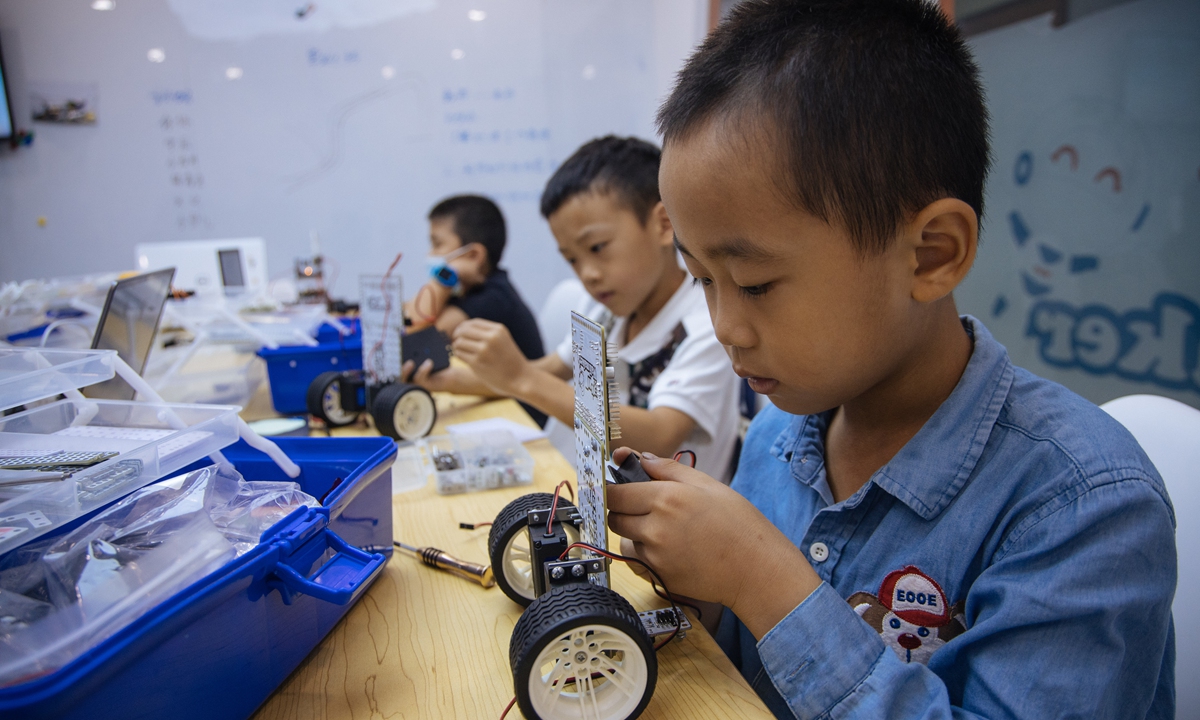Education authorities in Suzhou Industrial Park propose 'homework circuit breaker mechanism,' drawing mixed reactions

A student learns how to program in an elementary school in Beijing on Tuesday. Off-campus hobby programs, such as sports training and computer science classes, have become popular among students as China's authorities seek to cut excessive homework and after-school tutoring. Photo: Li Hao/GT
The Education Bureau of Suzhou Industrial Park in Suzhou, East China's Jiangsu Province, recently urged schools to adopt a "homework circuit breaker mechanism," suggesting that students who have not completed their homework before a specified time should go bed even if they have not finished their homework in order to improve students' physical and mental health and their all-round development. This provision, however, has drawn mixed reviews from parents.The rules state that if primary students have not completed their homework by 9:20 pm, middle school students by 10 pm, and high school students by 11 pm, parents are encouraged to have their children stop their homework and go to bed to ensure they get enough sleep, according to CNR.
The local education bureau pointed out that the student only needs to explain the situation to the teacher the next day, and there is no need to make up the unfinished assignments.
Teachers are expected to make teaching adjustments based on the circumstances to enhance the effectiveness of the students' learning, said the local educational authorities.
A local teacher said that schools place great importance on the regulations issued by the education bureau. The relevant offices have clarified the requirements for grading assignments and asked teachers to teach students how to effectively manage their time.
In July 2021, China introduced rules that were dubbed "double reduction," aiming to ease the burden of excessive homework and off-campus tutoring for young students, according to the Xinhua News Agency.
Primary schools should ensure that students in the first and second grades do not have written homework, and those in higher grades complete their homework within no more than one hour, according to a circular issued by the Ministry of Education.
Junior high students should spend a maximum of one and a half hours on their written homework each day, read the circular, calling for an appropriate amount of homework even for weekends as well as summer and winter holidays.
Following the "double reduction" policy, several provinces in China, including East China's Anhui Province, East China's Jiangsu Province, and South China's Guangxi Zhuang Autonomous Region, introduced "circuit breaker" mechanisms as a way to guarantee students get enough sleep.
Yin Fei, assistant dean of the School of Psychology, Nanjing Normal University, said that this mechanism represents a policy effort from the educational system, aiming to cut off the pressure that schools load on children.
Parents have expressed concerns about the initiative.
Some argued it could exacerbate the polarization of students' academic performance. Other parents view the initiative as very student-centered, as it enables children to have sufficient sleep. They believe that as the policy is gradually implemented, the pressure on students will be alleviated.
Sun Yunxiao, an expert with the China Youth and Children Research Center, said that the homework suspension mechanism is essentially a protective measure for children. Sun added that a single mechanism cannot address all issues, as the reasons for not completing homework are quite complex.
Global Times



